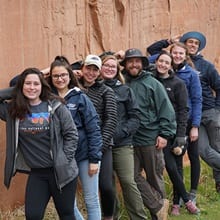Alternative Spring Break Programs and Ideas for College Students

If you like to travel, participate in service projects and learn about systematic issues and how they affect communities, an alternative spring break trip might be for you. You can volunteer your time away from classes to help a community in need, traveling domestically or internationally, with a group of college students committed to a service-learning project.
For Nejra Fazlic ’19, participating in an alternative break trip was a no-brainer. By her senior year at Southern New Hampshire University (SNHU), she had been on three through The Chandler Center, the campus community and civic engagement office. “Service is a big part of who I am,” she said.
At 3-years-old, she came to the U.S. as a refugee. “That has really shaped me into who I am and made me really passionate to give back,” she said. “Especially when I have been given so many opportunities myself.”

“SNHU is part of this movement because we believe that part of our mission is preparing an educated citizenry to participate in the common good,” Elizabeth Richards, The Chandler Center’s director, said. “Alternative break is just one way we try to achieve this goal.”
What is an Alternative Spring Break?
An alternative spring break hones in on a social or environmental issue facing a specific group of people. While these service trips can be completed year-round, some universities offer it as an alternative way for students to spend their mid-semester break.
“On an alternative break trip, you work closely with a community organization to really understand the systemic issues impacting the community where you’re serving,” Richards said. Not only will you learn from organizations committed to the cause, but you’ll have an opportunity to interact with the people directly affected by the issue.
While the trip itself happens over break, Richards, who has worked with alternative break groups for 10 years, said it isn’t a one-week experience; it’s a three-part journey.
- Ahead of the trip, you learn about the issues you will address through service. Not only does this educational piece prepare you for the experience, but it helps you understand the root of the problems.
- While on the trip, you serve the community you learned about in your pre-trip education. Serving looks different from project to project, but you’ll likely receive a trip itinerary that outlines your day to day activities ahead of the trip.
- Throughout the trip, you reflect on your experiences, connecting what you’ve learned with the work you’re doing. By reflecting on your thoughts and emotions, you create meaning.
“Service without education and reflection can feel meaningless,” Richards said. “When I ask people to share a service experience they’ve had that was bad, they almost always explain an experience where they were doing something and didn’t understand the meaning behind it.” By engaging in all three parts, you’ll get the most out of your alternative break experience, she said.
How to Give Your Time and Reap the Benefits

See if your university has an alternative break program. If so, they might subsidize the cost of the trip and handle logistics. You can also work directly with a community organization that offers volunteer opportunities.
Outreach 360, for example, is a nonprofit committed to expanding education, leadership and service opportunities in Latin America. This year will be the sixth time SNHU students have partnered with the organization to teach English in the Dominican Republic, but you can also sign up to volunteer directly through Outreach 360.
By participating in an alternative break, you gain more than memories and a good feeling. You may even gain a new perspective on the world.
“You get a chance to be part of another community for a short time and learn about how their culture is different from your own. This means you get to try new foods and hear different kinds of music and learn new words and see a part of the world you may never have seen,” Richards said. “You do all of this with a group of your peers who you become incredibly close to in a very short amount of time.”
Rebecca LeBoeuf ’18 is a staff writer at Southern New Hampshire University. Connect with her on LinkedIn.
Explore more content like this article

Heart, Hope and Some Help Along the Way: SNHU’s Fall Class of 2025

Old Time Charm, Big Time Fun at SNHU’s Homecoming

‘What if We Go Back to School... Together?’
About Southern New Hampshire University

SNHU is a nonprofit, accredited university with a mission to make high-quality education more accessible and affordable for everyone.
Founded in 1932, and online since 1995, we’ve helped countless students reach their goals with flexible, career-focused programs. Our 300-acre campus in Manchester, NH is home to over 3,000 students, and we serve over 135,000 students online. Visit our about SNHU page to learn more about our mission, accreditations, leadership team, national recognitions and awards.


